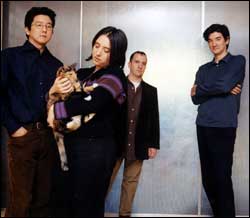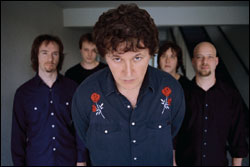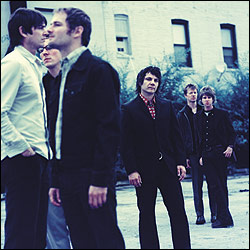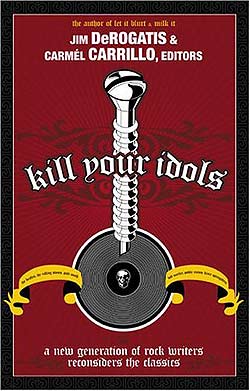i, aptly enough for a Magnetic Fields album, is a title with an even greater wealth of sexual connotations and typographical possibilities than the salacious number of 1999’s 69 Love Songs: Along with denoting everyone’s favorite subject, it can be used as a Roman numeral one, an imaginary number, a minor tonic chord, an upside-down exclamation mark, and, best of all, a tiny little penis. i as an album, though, feels like a scaling-down compared to the last one, offering a mere 14 songs instead of 69 and a stab at musical authenticity (the disc sounds more like the Fields in concert than their old cheapo–Phil Spector recordings) rather than the handmade synthetics of old—the fake hand claps in “I Thought You Were My Boyfriend” are as close to meat-and-potatoes Magnetic Fields as it gets here. I can’t imagine, though, how any kind of follow-up could be anything but faint disappointment. I consider 69 Love Songs the moment when auteur and cranky homosexualist Stephin Merritt demonstrated what a total fucking badass he could really be, nailing song after glorious love song over the course of three CDs; while near-faultless on its own terms, i ultimately feels too similar in tone and sound to the last one, like it was a 69 Love Songs Superfun Expansion Pack!
i does at least have a neat organizing concept, à la 69LS: All the song titles begin with the letter “i” and appear in strict word-by-word alphabetical order. “i” is a word that could fool you into thinking of the album as a “personal statement” by Stephin Merritt rather than a mere formal gesture—but keep in mind that this “i” is lowercase, implying the traditionally capitalized “I” of consciousness and the self negated out of perverse modesty, or maybe just perversity. i is clearly, then, a perfect fit with Merritt’s career-long rejection of the transparent autobiography of confessional singer-songwriters in favor of songs written with a riot of perspectives.
i isn’t quite as willful in this regard as 69LS: That album had women as men and men as women singing odes to women and men and dogs and guitars and lovers dressed as bunny rabbits. I miss this in i‘s smaller scale, as Merritt sings lead on all of the songs, usually from no obviously gendered perspective, sometimes even avoiding matters of love and lust altogether. “I Was Born,” for example, renders life from the womb to the void as an event that starts dismally and just gets incrementally shittier as you go “one more rung down that black ladder every day.”
I would imagine that all this might make a normal person want to run fleeing from such miserablist hooey. If anything, though, Merritt’s lyrical flirtations with existential horror are what make his songs so charming. Imagine love and life experienced only at their most Baudelarian limits, either hellish spleen or ecstatic idéal, an “outpouring of emotion/As boring as an ocean” (“Is This What They Used to Call Love?”) versus “You kiss me/I’m history” (“I’m Tongue-Tied”), the former usually winning out—though, since Merritt ties both to self-destruction, it’s often hard to tell the difference between them anyway.
Imparting every extreme state of mind with his unwholesome sense of humor, Merritt will gently subvert them—with an intentionally overwrought metaphor, a silly rhyme, a rococo arrangement, or, best of all, casual violence. Impeccably sung with the croak of a frog prince straining to perform his lily pad aria, Merritt follows the generic pop yearning of “Maybe somewhere I could be free” with “Somewhere they won’t throw rocks at me” in the sad clown story “I Looked All Over Town,” and recounts the touching tale of a senile father who delivers his daughter her favorite chocolates via car accident in “Irma.” Impersonated by a sexy doppelgänger who culls, conquers, cuts, and kills for his sake in “I Wish I Had an Evil Twin,” Merritt moans that he’d enjoy the fruits of his twin’s brutality but “Feel no shame/’Cause evil’s not my cup of tea.”
Impressively, Merritt can abjure the sardonic for something almost approaching sincere. In 1999, a deadpan line about making a man his wife was one the effervescent punch lines of his “When My Boy Walks Down the Street.” In 2004, Merritt sings “marry me” in “It’s Only Time” with a contented quaver, like he’s letting out a relieved sigh. Ironically . . . well, “It’s Only Time” seems to be completely irony-free. It has no obvious jokes or purple similes, none of the malicious wit or self-loathing of the other songs. It upends no love song clichés, wallowing instead in several hoary ones, like the inevitability of bad weather and the notion that time means nothing to those who really truly love: “What could stop this beating heart/Once it’s made a vow?/It’s only time.” It very well might be the most banal lyric he’s ever written, which seems appropriate given that banality is what usually comes out of one’s mouth in the throes of love. It’s also appropriate that when stripped of his protective playfulness with song form and Echoplex and Casio presets, Merritt’s voice sounds tremulous and exposed.
It’s impossible to say what this all might mean. It’s intriguing to think the song might’ve been written with our country’s recent hand-wringing over gay marriage in mind; even if nothing of that sort was intended . . . well, who cares about intentions when you’ve got a song so nakedly devoted it should be the song of choice for first dances at gay (and straight!) marriages for years to come? It’s tempting to think that Merritt, that incorrigible ironist, was indeed paying homage to the more respectable passions—though of course, knowing him, the next time around he’ll probably write a delightful song cycle about necrophilia.








